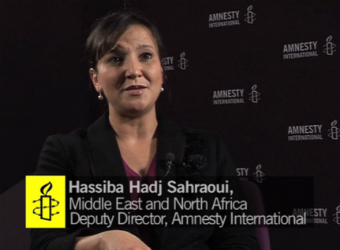Egypt has seen state violence on an “unprecedented scale” since the army overthrew Islamist President Mohamed Morsi last July following mass protests again his rule, Amnesty International said in a report on Thursday.
Egypt’s authorities “quash dissent and trample on human rights”, Amnesty said, pointing to mass arrests, pressure on the freedom of expression and the introduction of a law that limits the right to protest.
The report came out two days before the third anniversary of the mass uprising that toppled President Hosni Mubarak in 2011.
About 1,400 people have been killed in political violence since army chief Abdel Fattah al-Sisi ousted Morsi, mostly due to “excessive force used by security forces”, the international human rights group said.
On August 14, the bloodiest day since Morsi’s ouster, security forces stormed pro-Morsi protest camps in Cairo with bulldozers, using live ammunition and killing hundreds.
Thousands more have been arrested, including most of the leadership of Morsi’s Muslim Brotherhood, which the government declared a “terrorist organisation” on December 25.
“Security forces have been given free rein to act above the law and with no prospect of being held to account for abuses,” Amnesty said.
“Egypt has witnessed a series of damaging blows to human rights and state violence on an unprecedented scale over the last seven months,” said Hassiba Hadj Sahraoui, deputy director of the Middle East and North Africa programme at Amnesty.
Egypt’s interim government says it is committed to democracy and human rights. It accuses the Brotherhood of carrying out acts that threaten national security.
The next step in an army-backed road map for political transition are parliamentary and presidential elections. Sisi is widely expected to win, should he decide to run.
Activists who are seen as symbols of the 2011 protest movements against Mubarak have been jailed for breaking a law introduced last November that makes demonstrations without prior police approval illegal.
Several journalists connected with the Qatar-based Al Jazeera media network, whom the government views as sympathetic to the Brotherhood, have been detained. Al Jazeera’s Cairo offices were shut last July.
“There is a concerted effort underway to squeeze out any independent observers, from activists, to journalists, to non-governmental organizations,” said Sahraoui.


